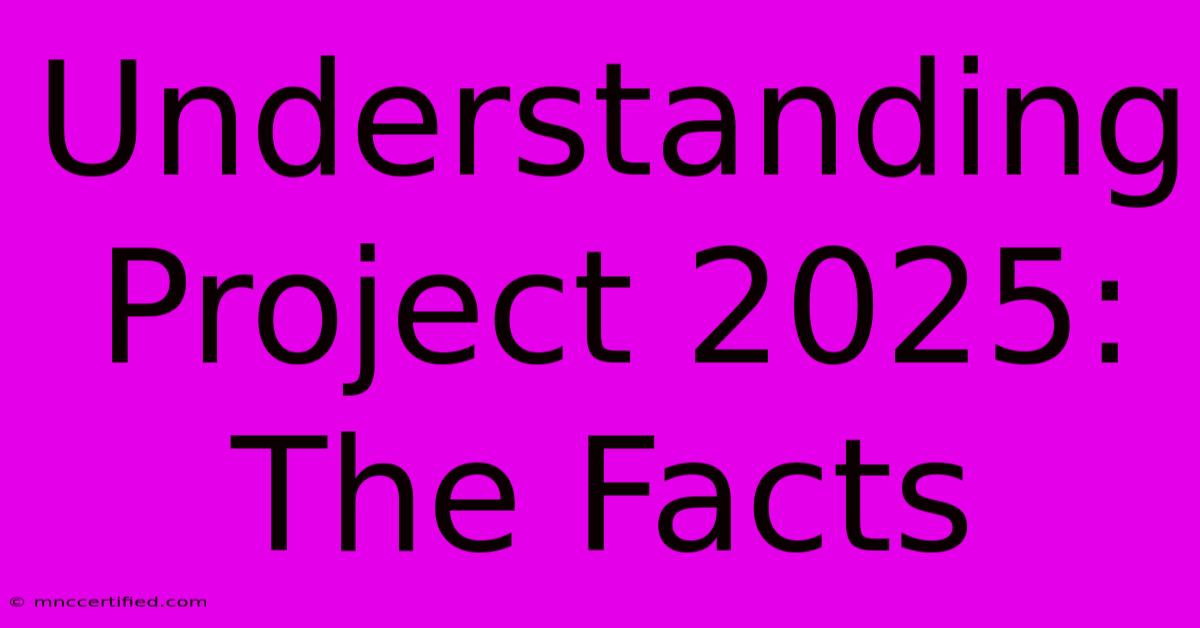Understanding Project 2025: The Facts

Table of Contents
Understanding Project 2025: The Facts
The term "Project 2025" has been circulating in various sectors, sparking curiosity and speculation. This article aims to demystify the project, providing clear information about its objectives, scope, and potential impact.
What is Project 2025?
Project 2025 is a multifaceted initiative encompassing a range of strategic plans and goals aimed at achieving specific objectives by the year 2025. However, the term "Project 2025" is not a singular entity. It represents a collective term for different projects with similar goals and timelines. This creates confusion and requires us to delve into the specific sectors where this term is used to understand its implications.
Project 2025 in Different Industries:
- Manufacturing: In the manufacturing sector, "Project 2025" often refers to the Industry 4.0 revolution, which emphasizes automation, data-driven decision-making, and interconnectedness within the production process. The goal is to enhance efficiency, flexibility, and productivity within factories and supply chains.
- Healthcare: In healthcare, "Project 2025" might represent initiatives focused on improving patient care and outcomes by leveraging digital technologies. These initiatives could involve integrating electronic health records, implementing telemedicine solutions, and developing personalized treatment plans.
- Education: Within the educational sphere, "Project 2025" might encompass projects centered around enhancing educational accessibility, improving curriculum design, and integrating digital learning tools to prepare students for the future workforce.
Key Goals and Objectives of Project 2025:
While the specific goals and objectives vary depending on the sector, some common themes emerge across different "Project 2025" initiatives:
- Digital Transformation: Many projects focus on harnessing technology to improve efficiency, productivity, and user experience.
- Sustainability: Emphasis on environmental sustainability, resource conservation, and reducing carbon footprint is often present.
- Innovation: Encouraging research and development, fostering innovation, and adapting to changing market demands.
- Skills Development: Preparing the workforce for future needs by improving education and training programs.
- Data-Driven Decision Making: Utilizing data analysis and insights to inform strategic planning and optimize operations.
Challenges and Criticisms:
Like any ambitious project, "Project 2025" faces challenges. Some criticisms include:
- Lack of Standardization: The lack of a clear definition and standardized goals can lead to confusion and difficulty in measuring progress.
- Implementation Issues: Successfully integrating complex technological solutions and changing established processes can be challenging.
- Ethical Concerns: Issues related to data privacy, job displacement due to automation, and equitable access to technology need careful consideration.
Conclusion:
Understanding "Project 2025" requires recognizing its multifaceted nature. The term serves as an umbrella for diverse initiatives, each with its specific objectives and impact. While challenges exist, these projects hold the potential to transform various sectors and create a more sustainable, efficient, and innovative future.
To gain deeper insight into "Project 2025," it is crucial to focus on specific sectors and identify the initiatives within those sectors. By doing so, we can better understand the individual goals, potential benefits, and potential challenges of this ambitious undertaking.

Thank you for visiting our website wich cover about Understanding Project 2025: The Facts. We hope the information provided has been useful to you. Feel free to contact us if you have any questions or need further assistance. See you next time and dont miss to bookmark.
Featured Posts
-
Insurance Fraud Investigator Certification
Nov 07, 2024
-
University Provides Wellbeing Support After Incident
Nov 07, 2024
-
Usha Vance From Lawyer To Second Lady
Nov 07, 2024
-
Lurie Leads Early In San Francisco Mayoral Race
Nov 07, 2024
-
Trumps White House Visit Boosts Dogecoin 25
Nov 07, 2024